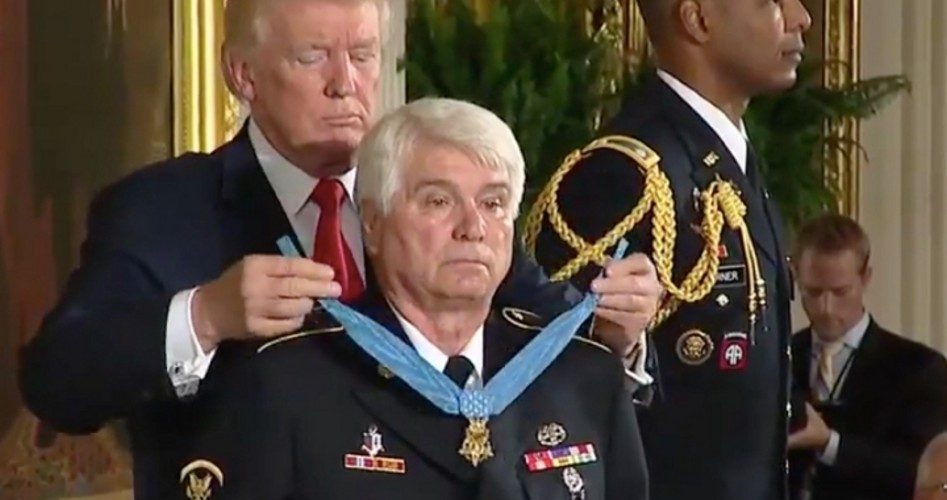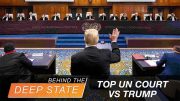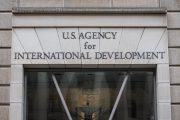
In a first for his administration, President Donald Trump presented the Medal of Honor July 31 to a Vietnam War Army medic whose actions on the field of battle over a two-day period 48 years ago saved the lives of 10 fellow soldiers and helped turn back a North Vietnamese attack.
James McCloughan was a 23-year-old combat medic in May 1969 when his unit was flown into a jungle area near the city of Tam Ky along Vietnam’s central coast. Almost immediately the unit came under attack and two U.S. helicopters were shot down. McCloughan, now 71, recalled that “it was a hot [landing zone]. The minute that we got there, we were fired upon.”
Surrounded by the enemy, McCloughan exited a helicopter and sprinted 100 meters through heavy weapons fire to rescue a badly injured comrade and carry him to safety, recalled President Trump in his remarks. “But this was only the first of many heroic deeds Jim would perform over the next 48 hours.”
Later that day, McCloughan and his platoon were ambushed by North Vietnamese troops and suffered severe casualties. While aiding two wounded soldiers, McCloughan himself was hit and severely wounded by shrapnel from an enemy rocket-propelled grenade.
However, recalled the president, “that terrible wound didn’t stop Jim from pulling those two men to safety. Nor did it stop him from answering the call of another wounded soldier and carrying him to safety atop his own badly injured body.”
Ignoring a direct order to the contrary, McCloughan made his way into danger four more times to rescue wounded soldiers. The Medal of Honor citation states that although he was bleeding heavily from wounds to his head and entire body, McCloughan refused to be evacuated, remaining in the heat of battle with his fellow soldiers, who were heavily outnumbered by North Vietnamese forces.
As the first day of fighting came to a close, McCloughan’s unit pulled back into a defensive position, but there was “one soldier’s plea Jim could not ignore,” said Trump. Watching McCloughan crawl through a rice paddy with bullets raining all around him, his fellow soldiers were sure they had seen the last of the medic. “But after several minutes passed, Jim emerged from the smoke and fire carrying yet another soldier,” recounted the president. As he placed the soldier onto a medevac helicopter, his commanding officer ordered McCloughan aboard, but the medic refused. “’You are going to need me here,'” Trump recalled McCloughan telling the officer. “As Jim now says, ‘I would have rather died on the battlefield than know that men died because they did not have a medic.’”
The next day McCloughan’s platoon was ordered to advance, and McCloughan was again wounded by small arms fire and shrapnel while helping two wounded soldiers.
Later that day two companies from the 2nd North Vietnamese Army Division and an element of 700 soldiers from a Viet Cong regiment attacked McCloughan’s unit on three sides. McCloughan’s citation recalls that the medic “went into the crossfire numerous times throughout the battle to extract the wounded soldiers. His relentless and courageous actions inspired and motivated his comrades to fight for their survival.”
When his unit’s supplies ran low, McCloughan volunteered to position and hold a strobe light in an open area for a nighttime supply drop. “He remained steadfast while bullets landed all around him and rocket propelled grenades flew over his prone, exposed body,” his Medal of Honor citation recounts. “During the morning darkness of May 15, Private 1st Class McCloughan knocked out a rocket propelled grenade position with a grenade, fought and eliminated enemy soldiers,” and attended to wounded soldiers while organizing helicopter evacuations.
Trump recalled that over a 48-hour stretch, McCloughan rescued 10 American soldiers and tended to countless others. “He was one of 32 men who fought until the end. They held their ground against more than 2,000 enemy troops.”
Toward the end of his remarks the president recalled one particularly poignant story about McCloughan. “On the second day of that bloody fight, Jim found a few soldiers and a fellow soldier who had been shot badly in the stomach,” recalled Trump. “He knew the soldier wouldn’t make it if he flung him on the back, so he lifted him up and carried him in his arms. As Jim was carrying the soldier, a thought flashed through his mind. Although Jim had always been very close to his father, he realized that it was not since he had been a young boy that he had told his dad those three very simple but beautiful words: ‘I love you.’”
Mr. Trump recalled that in that moment “Jim offered up a prayer. He asked God, ‘If you get me out of this hell on Earth so I can tell my dad I love him, I’ll be the best coach and the best father you could ever ask for.’”
Continued the president: “Jim made it out of that hell on Earth…. And the first thing he did when he arrived back on American soil was to say those beautiful words: ‘I love you, Dad. I love you.’ Jim said those words over and over again for the next 22 years until the last time he saw his father, the night before his dad passed on.’”
Added the president: “Today, I’d venture to say his dad is the proudest father in heaven. Jim fought with all of the love and courage in his soul. He was prepared to lay down his life so his brothers-in-arms could live theirs.”
Military.com noted that in attendance at McCloughan’s Medal of Honor ceremony were 10 of his fellow soldiers, “five whom McCloughan saved in the battle. Trump called all of them by first name and thanked them for their sacrifice and service. ‘Stand up, wherever you may be. Where are you?’ Trump said. Applause filled the room as the men stood.”
After leaving the Army in 1970 McCloughan spent decades as a high school teacher and coach, retiring in 2008.
In 2016, Defense Secretary Ash Carter recommended McCloughan for the Medal of Honor. But because the medal must be awarded within five years of the recipient’s actions, Congress stepped in to pass a bill waiving the time limit for McCloughan.
Photo of President Trump presenting Medal of Honor to James McCloughan: White House



